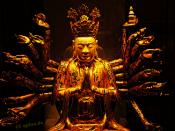Tibetan Buddhism and Sacred Sound
Music is a form of expression that can reach the inner most parts of a person's being and displays an emotion that they themselves may not have been able to identify. Across all parts of the world, all religions, music is a consistent theme that bands groups together in a central focus or theme. Through holy hymns or earnest chants that praise their deities, music has the capability of stimulating the thoughts and minds of worshipers alike, and is regarded as having a significant role in religious teaching. In all the religions, worldwide, music has a very essential purpose and a varied range of uses. Buddha's teachings mention music on many occasions. In the book Amitabha Sutra, a manuscript collected of Buddha's lessons, says that heavenly singing and chanting is supposedly heard all day and night. And, the sounds of nature coming together make a musical sound that blend together advocating harmony, peace and a mindfulness of Buddha and Dharma and their teachings.
In Buddhism, sutras also known as hymns, praising the qualities of the Buddha's are thought to purify the hearts of the people and Buddha's followers music was customary as a sort of traditional gift that is made to Buddha. Buddhist music plays a fundamental part in the communal practices. If someone plays a certain sound or melody during worship it is usually easy for those listening or hearing the sound to interpret what emotion the sound is trying to portray. Now, for people to reach some point of assimilation, it is crucial to be able to connect and comprehend the other's frame of mind and moods and ultimately establish a sense of community. This is one of the roles music plays in religion worldwide. The gift of music being able to grasp...


